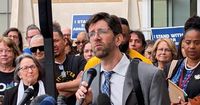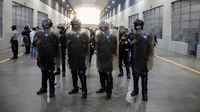A U.S. federal judge has deemed the Trump administration's deportation of Kilmar Abrego Garcia from Maryland to a notorious prison in El Salvador a "grievous error." Judge Paula Xinis ordered the administration to facilitate Abrego Garcia's return by 11:59 p.m. on April 7, 2025, rejecting the government's request to pause the order during its appeal.
In her ruling, Xinis emphasized that the defendants had no legal authority to arrest, detain, or deport Abrego Garcia, who had previously been granted a withholding of removal order due to fears of gang-related persecution in his home country. In a legal filing on April 6, she stated, "As defendants acknowledge, they had no legal authority to arrest him, no justification to detain him, and no grounds to send him to El Salvador — let alone deliver him into one of the most dangerous prisons in the Western Hemisphere."
Abrego Garcia, a Salvadoran metal worker, was arrested by federal agents on March 12, 2025, while his five-year-old child was in the back seat of his car. Initially, the government alleged he was part of the MS-13 gang, a claim that has not been substantiated in court. His attorneys have vehemently denied any gang affiliation, stating that the Trump administration has never provided evidence to support such accusations.
In a sworn declaration submitted on March 31, a U.S. Immigration and Customs Enforcement (ICE) official acknowledged that an "administrative error" led to Abrego Garcia's deportation, which flouted the 2019 order protecting him from removal to El Salvador. Xinis stated that placing him in such a facility, where rival gang members are intentionally mixed, "shocks the conscience."
During the legal proceedings, Xinis noted that the government had failed to demonstrate any grounds for Abrego Garcia's deportation. She remarked, "Defendants have claimed — without any evidence — that Abrego Garcia is a member of MS-13 and then housed him among the chief rival gang, Barrio 18. Not to mention that Barrio 18 is the very gang whose years-long persecution of Abrego Garcia resulted in his withholding from removal to El Salvador."
The case has drawn attention as it represents a broader trend of the Trump administration's aggressive immigration policies, which have seen many migrants caught in legal limbo. Abrego Garcia's deportation is just one of many instances where individuals have faced severe consequences due to administrative errors or misapplied policies.
In a related development, the Department of Justice has placed U.S. Attorney Erez Reuveni on leave after he expressed frustration over the government's inability to provide clear answers regarding Abrego Garcia's deportation. This move has raised eyebrows within the Justice Department, as Reuveni has been known for his willingness to take on challenging cases.
As the legal battle unfolds, the Trump administration is seeking to pause the court's order, arguing that the removal was not an error but rather a necessary action against alleged gang members. However, the administration's claims have been met with skepticism, particularly since Abrego Garcia has not been charged with any crime in El Salvador or the United States.
In a separate but related case, the U.S. Supreme Court temporarily halted a judge's order requiring the administration to return Abrego Garcia, granting the justices additional time to consider the administration's request to block the ruling while litigation continues. Chief Justice John Roberts issued the administrative stay, allowing the court to review the case further.
Abrego Garcia's situation has resonated within the Salvadoran community in Maryland, many of whom feel targeted and vulnerable under the current administration's policies. Community members have expressed concerns about the lack of due process and the potential for wrongful deportations, particularly given the allegations against Abrego Garcia have not been substantiated.
Moreover, the Trump administration's stance on immigration has sparked significant backlash from human rights organizations. The Detention Watch Network criticized Trump's comments regarding sending American prisoners to El Salvador, labeling the suggestion authoritarian and dehumanizing. Advocacy groups argue that such proposals only serve to further marginalize vulnerable populations.
As the deadline for Abrego Garcia's return approaches, the legal and political ramifications of this case continue to unfold. The administration's handling of deportations, particularly in light of administrative errors, raises critical questions about the integrity of the immigration system and the rights of those caught within it.
In addition to Abrego Garcia's case, the U.S. Secretary of State has announced plans to suspend visas for South Sudanese nationals, further complicating the immigration landscape. This decision is part of a broader effort to enforce immigration laws more strictly and reflects the administration's ongoing commitment to reducing immigration numbers.
As the legal battles continue, the implications for Abrego Garcia and others like him remain uncertain. With community advocates rallying for justice and legal experts scrutinizing the administration's actions, this case may serve as a pivotal moment in the ongoing discourse surrounding immigration policy in the United States.







